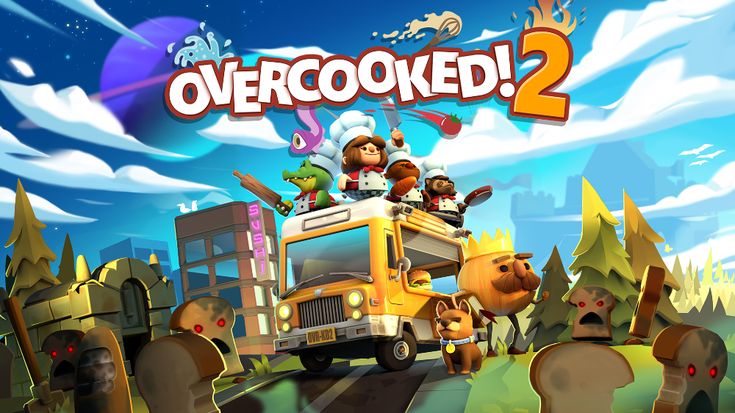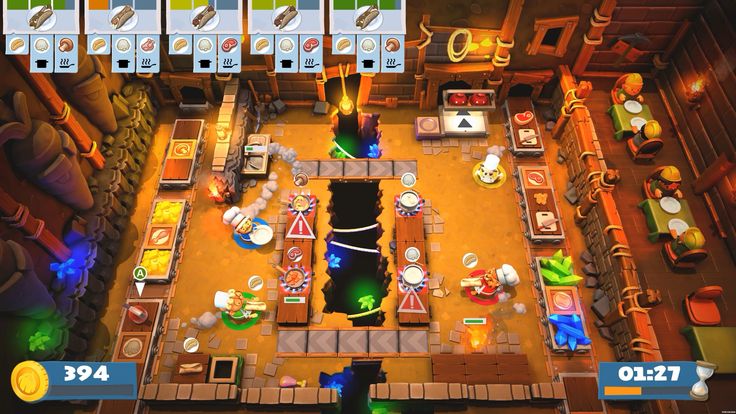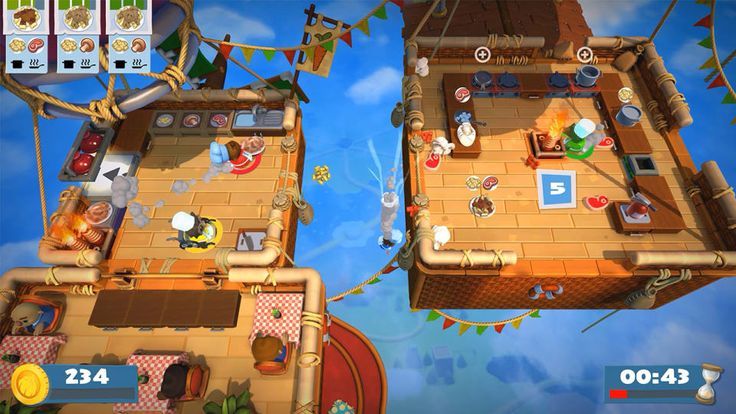
Mastering Chaos: The Best Strategies to Dominate Overcooked 2 – Overcooked 2 is not just another cooking simulation game—it’s an adrenaline-pumping test of teamwork, strategy, and quick thinking. Whether you’re a newcomer looking to learn the ropes or a seasoned chef aiming to refine your techniques, mastering chaos is the key to conquering each level. Let’s dive into the best strategies to transform your gameplay and take your kitchen coordination to a whole new level.
Table of Contents
- Introduction to Overcooked 2
- Understanding the Core Mechanics
- Building a Strong Foundation: Communication and Coordination
- Optimizing Kitchen Layout and Organization
- Mastering Recipes and Time Management
- Adapting to Dynamic Environments
- Special Strategies for Challenging Levels
- Practice, Patience, and Continuous Improvement
- Conclusion: Embrace the Chaos
1. Introduction to Overcooked 2
Overcooked 2 is an award-winning cooperative cooking simulation game that pushes players to work together under pressure. With its vibrant graphics, quirky sound effects, and increasingly complex kitchen layouts, the game offers an immersive experience where every second counts. The appeal of Overcooked 2 lies in its blend of strategy, coordination, and chaotic fun. In this article, we provide you with actionable strategies and insights to not only survive the madness but also to dominate every level with confidence.
2. Understanding the Core Mechanics
Before you can master the game, it’s essential to understand its underlying mechanics. Overcooked 2 challenges players with a mix of recipe management, order fulfillment, and constant environmental changes. Here’s what you need to know:
The Gameplay Loop
- Order Management: Players are given a set of orders that need to be completed within a limited time. Prioritizing orders based on complexity and timing is crucial.
- Ingredient Gathering: Each recipe requires different ingredients scattered around the kitchen. Efficient movement and allocation of tasks are key.
- Cooking and Serving: After gathering the right ingredients, players need to chop, cook, and plate dishes before serving them to waiting customers.
- Obstacles and Challenges: As the game progresses, kitchens introduce obstacles such as moving platforms, disappearing ingredients, and limited workspaces that force players to adapt quickly.
Scoring System and Bonuses
Understanding how points are awarded can help you strategize better. Bonuses are often given for completing orders quickly, executing combo moves, or maintaining a streak of perfect deliveries. Keeping these factors in mind can help optimize your approach during each level.
3. Building a Strong Foundation: Communication and Coordination
One of the most critical aspects of succeeding in Overcooked 2 is robust communication and coordination among team members. Whether playing locally or online, the effectiveness of your team largely determines the outcome.
Establishing Clear Roles
- Assigning Tasks: At the start of each level, discuss and assign roles. One player might focus on chopping ingredients while another handles cooking. For example, designate one player as the “prep chef” and the other as the “cook and serve” specialist.
- Flexibility: While roles are important, adaptability is equally crucial. Be ready to switch tasks if you notice your teammate is overloaded. Flexibility prevents bottlenecks and ensures a smoother workflow.
Communication Techniques
- Verbal Cues: Use clear and concise language to communicate order priorities and urgent tasks. Phrases like “I’m on chopping!” or “Need help at the stove!” can prevent miscommunication.
- Non-Verbal Signals: If voice chat isn’t available, develop a set of non-verbal signals or simple in-game actions to indicate your status. For example, a quick movement toward a station can signal that you’re free to help.
- Regular Check-ins: Periodically review the kitchen’s status. A quick “How are we doing?” can help realign the team’s focus, especially during hectic moments.
Overcoming Communication Barriers
For teams playing online, latency or audio issues may arise. In such cases, it’s wise to:
- Use In-Game Prompts: Leverage the game’s built-in communication features to quickly signal your actions.
- Pre-Plan Strategies: Before the level starts, agree on a basic strategy that everyone can follow, minimizing the need for constant communication during gameplay.

4. Optimizing Kitchen Layout and Organization
The kitchen layout in Overcooked 2 can make or break your efficiency. Each level presents a unique configuration of stations, obstacles, and pathways. Optimizing your kitchen layout is a fundamental strategy to mastering chaos.
Analyzing the Kitchen
- Survey the Layout: As soon as a level begins, take a moment to survey the kitchen. Identify critical stations like ingredient storage, chopping boards, cooking areas, and serving windows.
- Identify Bottlenecks: Look for areas where players might crowd together. Plan a route that minimizes overlap and ensures smooth movement between stations.
Strategic Station Placement
- Centralized Communication Hub: Designate a central area where team members can quickly exchange ingredients or update each other on order statuses.
- Zone Division: Divide the kitchen into zones where each player is responsible for a specific section. For example, one player might manage the left side of the kitchen while the other covers the right.
- Efficiency in Movement: Prioritize pathways that allow for quick transfers. Avoid backtracking or excessive crisscrossing that can lead to delays.
Utilizing Environmental Elements
- Leverage Obstacles: Some levels have moving platforms or conveyor belts. Use these to your advantage by positioning ingredients in such a way that the obstacles work in your favor rather than against you.
- Adaptable Layouts: Be prepared to rearrange your workflow as the kitchen layout changes during a level. Adaptability is key to managing dynamic environments.
5. Mastering Recipes and Time Management
In Overcooked 2, every second counts, and mastering the recipes is a skill that can give you a competitive edge. Knowing your recipes by heart and managing your time efficiently is crucial for scoring high and satisfying orders.
Understanding Recipe Requirements
- Ingredient Combinations: Familiarize yourself with all the recipes in the game. Knowing the ingredients required for each dish will reduce time spent searching and guessing.
- Preparation Steps: Break down each recipe into simple steps—gather, chop, cook, plate, and serve. By internalizing these steps, you can execute tasks faster and with fewer mistakes.
- Complexity Levels: Some recipes are more complex than others. Prioritize simpler dishes during hectic moments, and tackle the more complicated recipes when the kitchen is less crowded.
Efficient Time Management
- Pre-Planning: Before diving into the cooking frenzy, quickly plan out the sequence of actions. This helps in allocating tasks and minimizing idle time.
- Simultaneous Actions: Learn to multitask by combining actions. For example, while one player handles chopping, another should preheat the stove or set up the serving station.
- Task Batching: Group similar tasks together to streamline the cooking process. Batch chopping ingredients for multiple orders or cooking similar dishes simultaneously can save precious seconds.
- Avoiding Overcommitment: Don’t try to do too many things at once if it compromises the quality of your output. Focus on completing tasks one step at a time, and delegate where necessary.
Leveraging In-Game Bonuses
- Combo Bonuses: Some levels offer bonus points for serving dishes quickly or in rapid succession. Keep an eye on the timer and strive for combo moves that boost your score.
- Time Extensions: Occasionally, successfully completing orders in record time may earn you additional seconds. Use these moments to catch up on pending tasks or prepare for the next wave of orders.

6. Adapting to Dynamic Environments
One of the defining features of Overcooked 2 is its ever-changing kitchen environments. From moving platforms to unpredictable hazards, being able to adapt quickly is vital to your success.
Recognizing Environmental Challenges
- Moving Platforms and Shifting Layouts: Many levels incorporate platforms that move, requiring you to adjust your pathing and timing. Recognize these patterns early and plan your moves accordingly.
- Hazardous Elements: Some kitchens feature hazards like fires, water hazards, or sudden obstacles. Always be aware of your surroundings and have a contingency plan.
- Limited Resources: In levels where ingredients or utensils are scarce, efficient resource management becomes even more critical. Prioritize essential tasks and avoid unnecessary movements.
Strategies for Adaptability
- Practice Under Pressure: Regularly practice levels that have dynamic elements to improve your reflexes and decision-making under pressure.
- Develop a Backup Plan: Always have an alternate strategy ready. If one approach isn’t working due to unexpected changes, be prepared to switch roles or reroute your actions.
- Learn from Mistakes: After each level, review your performance with your team. Identify moments where environmental factors disrupted your flow and discuss strategies to mitigate these challenges in future rounds.
- Stay Calm: The key to adapting in chaotic environments is maintaining a calm mindset. Panic can lead to rushed decisions and mistakes, so focus on steady, deliberate actions even when things seem out of control.
7. Special Strategies for Challenging Levels
As you progress in Overcooked 2, you’ll encounter levels that push your skills to the limit. These challenging stages often require specialized strategies to overcome their unique hurdles.
The Conveyor Belt Conundrum
- Anticipate the Flow: Levels featuring conveyor belts demand that you predict the movement of ingredients. Position yourself where you can intercept items quickly.
- Divide and Conquer: Split responsibilities so that one player manages the belt while the other focuses on cooking and plating. This ensures that items are collected and processed without delay.
- Clear Communication: Keep your partner informed about incoming ingredients and obstacles. A well-timed shout can help prevent ingredients from being lost or dishes from being delayed.
Kitchens with Limited Space
- Maximize Efficiency: When working in a cramped kitchen, every inch counts. Plan your movements carefully to avoid collisions and minimize wasted steps.
- Streamline Processes: In tight spaces, focus on the most essential tasks first. Prioritize actions that have the highest impact on order completion and avoid unnecessary detours.
- Use Corners Wisely: Corners can serve as temporary holding spots for ingredients or as meeting points for the team. Use them strategically to keep the main pathways clear.
Levels with Environmental Hazards
- Hazard Mapping: Quickly identify all potential hazards as soon as the level begins. Map out safe zones and plan your work accordingly.
- Protective Coordination: Work as a unit to shield vulnerable areas of the kitchen. If one player is dealing with a hazard, the other should cover critical cooking or serving tasks.
- Reactive Strategies: Remain agile and ready to change tactics if a hazard suddenly disrupts your workflow. Flexibility in these scenarios is the hallmark of an expert Overcooked 2 team.

8. Practice, Patience, and Continuous Improvement
Even with the best strategies, mastering Overcooked 2 is a journey that demands continuous practice, patience, and learning from experience. Here are some tips to help you keep improving:
Embrace the Learning Curve
- Start Simple: Begin with easier levels to build confidence and understand the game mechanics. Gradually work your way up to the more challenging stages.
- Review and Reflect: After each session, take a moment to analyze what went well and what could be improved. Identifying recurring issues can help refine your approach over time.
- Team Debriefs: If playing with friends or online teammates, discuss the level afterward. Sharing feedback and strategies can lead to collective improvement and a better overall performance.
Training Drills and Solo Practice
- Individual Drills: Practice specific skills such as chopping, cooking, or precise movement in controlled environments. The more you master individual components, the smoother your overall gameplay will become.
- Solo Challenges: Although Overcooked 2 is primarily a cooperative game, playing solo can help you develop a deeper understanding of the kitchen layouts and task flows. Use these opportunities to experiment with new strategies without the pressure of a team.
Leveraging Online Communities and Resources
- Join Forums and Groups: Online communities such as Reddit and gaming forums often share valuable insights and advanced tactics. Engaging with these communities can expose you to new strategies and common pitfalls to avoid.
- Watch Expert Gameplay: There are numerous video tutorials and streams where top players demonstrate their techniques. Observing their playstyle can inspire new approaches and help you refine your skills.
- Update Your Strategy: The game evolves over time, and so should your strategies. Stay updated with any patches or updates that may change the dynamics of gameplay, and be ready to adjust your tactics accordingly.
Mental and Physical Preparation
- Stay Calm Under Pressure: High-pressure moments are inevitable. Practice mindfulness techniques to maintain composure during the most chaotic phases of the game.
- Regular Breaks: Avoid burnout by taking regular breaks during long gaming sessions. A rested mind often performs better under stress.
- Team Morale: Keep a positive atmosphere in your team. A supportive, upbeat environment not only improves communication but also enhances overall performance.
9. Conclusion: Embrace the Chaos
Mastering Overcooked 2 is about more than just following a set of instructions—it’s about embracing the chaos, learning from every frantic moment, and continually adapting to new challenges. With a deep understanding of core mechanics, a focus on clear communication, and a commitment to optimizing every aspect of your kitchen strategy, you can transform even the most chaotic levels into a well-oiled machine.
By employing the best strategies outlined in this guide, you’re not only prepared to dominate the game but also to enjoy the journey of learning and improvement. Every game is a new opportunity to experiment with innovative tactics, build stronger team coordination, and ultimately achieve that coveted high score. Remember, the road to becoming an Overcooked 2 master is paved with patience, practice, and a willingness to adapt under pressure.
So, gather your teammates, gear up, and step into the vibrant, unpredictable world of Overcooked 2. With these strategies at your disposal, you’re ready to master the chaos and dominate every level that comes your way.
Final Thoughts
Overcooked 2 is a brilliant blend of culinary chaos and strategic planning, challenging players to operate under pressure while maintaining seamless teamwork. By implementing these best strategies—prioritizing communication, optimizing your kitchen layout, mastering recipes, and adapting to ever-changing environments—you’ll be well on your way to dominating the game.
Whether you’re a casual player looking for fun or a competitive gamer aiming for top scores, the journey to mastering Overcooked 2 is as rewarding as it is challenging. Embrace each moment of chaos, learn from every mistake, and keep honing your skills. With persistence and the right strategies, you’ll soon find that the kitchen is not a battlefield but a stage for culinary mastery.
Remember, every round is an opportunity to refine your approach, experiment with new tactics, and ultimately, enjoy the thrilling experience that is Overcooked 2. So, don your chef’s hat, rally your team, and get ready to transform chaos into your greatest asset.
Happy cooking and game on!





